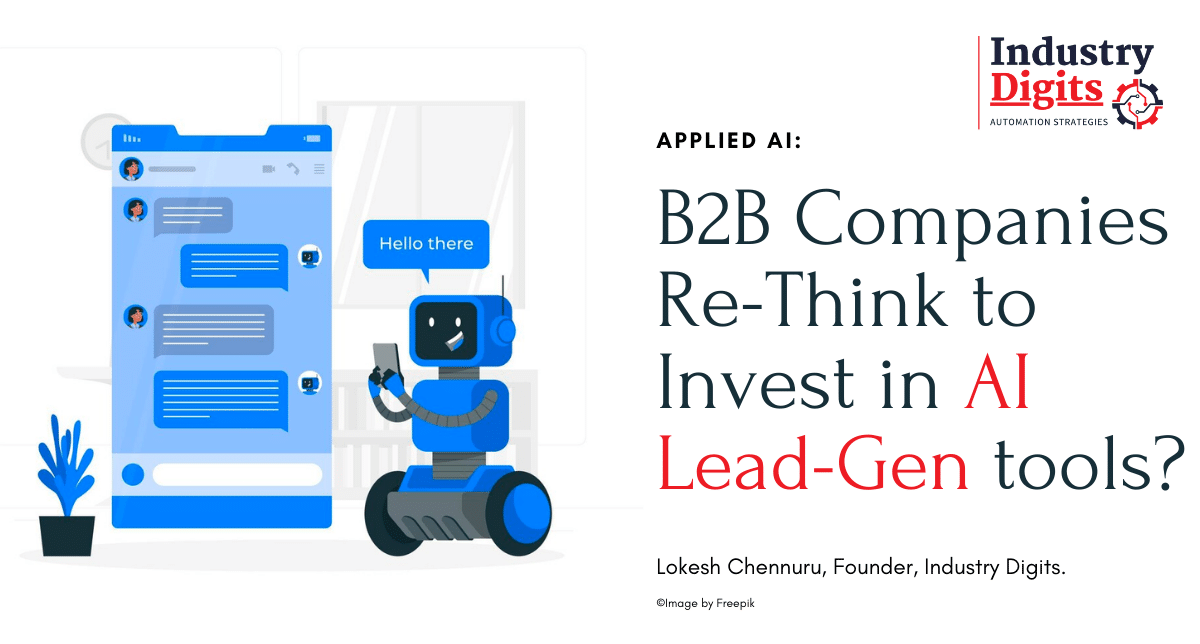Unlock Performance and Growth With AI Automation for B2B Firms
AI automation is changing the landscape for B2B firms. It enhances operations and minimizes dependence on human intervention. This change permits companies to make quicker, data-driven choices. As organizations check out which refines to automate, they must likewise take into consideration the right devices to execute. Nevertheless, obstacles stay in taking on AI technology. The ramifications of these modifications can shape the future of lots of firms in ways yet to be completely comprehended.
Recognizing AI Automation in the B2B Context
As companies significantly seek effectiveness, recognizing AI automation in the B2B context becomes essential. AI automation includes using innovative technologies to enhance operations, minimize human intervention, and enhance decision-making processes. In the B2B landscape, this can materialize in various types, such as automating client service communications, managing supply chain logistics, or optimizing advertising campaigns. Firms can take advantage of AI to evaluate enormous datasets swiftly, allowing them to identify trends and understandings that educate critical options. AI systems can incorporate flawlessly with existing modern technologies, providing a natural system for handling company functions. This understanding lays the groundwork for organizations to explore how AI can transform their operations, improve productivity, and inevitably foster lasting development in a competitive market.
Trick Advantages of Implementing AI Automation

Recognizing Processes Appropriate for Automation
How can B2B business efficiently determine procedures suitable for automation? A methodical strategy begins with mapping out existing operations to identify taxing and repetitive jobs. These jobs commonly include information access, invoicing, and customer follow-ups. Firms ought to assess the regularity and volume of these processes, as high-frequency jobs provide the best opportunity for performance gains. Additionally, assessing the possibility for error reduction and source allocation can highlight areas ripe for automation. Engaging workers in conversations can likewise provide understandings right into which procedures prevent performance. Ultimately, firms need to take into consideration the placement of automation with their critical objectives, making certain that the recognized processes add to overall organization purposes, inevitably assisting in smoother operations and enhanced growth.

Selecting the Right AI Tools for Your Organization
When B2B firms think about automating their processes, selecting the appropriate AI tools becomes vital for attaining preferred results. Companies need to start by evaluating their one-of-a-kind demands and goals, guaranteeing positioning with company objectives. Assessing the assimilation, versatility, and scalability capacities of prospective tools is vital, as these factors establish long-lasting effectiveness (Business Process Automation). Organizations ought to likewise consider user-friendliness and the level of support supplied by vendors, as these elements can influence effective implementation. Additionally, assessing consumer evaluations and study can provide understandings into exactly how specific AI services perform in real-world circumstances. By thoroughly picking AI devices that fit their operational requirements, B2B firms can boost performance and drive development while reducing potential disturbances
Getting Over Obstacles in AI Fostering
B2B companies often encounter significant obstacles in embracing AI technologies, specifically problems associated with information high quality and resistance to change monitoring. Poor information top quality can hinder the performance of AI systems, while worker reluctance to embrace brand-new processes can delay execution initiatives. Dealing with these obstacles is vital for successful AI assimilation and maximizing its possible benefits.
Data High Quality Issues
Assuring high information quality is crucial for the successful fostering of AI modern technologies in business-to-business environments. Incorrect, insufficient, or outdated data can badly prevent AI initiatives, bring about wrong insights and poor decision-making. Companies usually face challenges such as data silos, disparities throughout different sources, and a lack of standardized data styles. To get over these concerns, companies must invest in information cleaning, assimilation, and administration procedures (AI Automation For B2B). Carrying out durable information administration techniques guarantees that the info fed into AI systems is reliable and relevant. Fostering a culture of information top quality recognition among staff members can boost information accuracy over time. By dealing with data high quality problems, B2B firms can launch the full potential of AI automation, driving performance and development
Change Monitoring Resistance
Getting over modification administration resistance is necessary for the successful implementation of AI initiatives within companies. Staff members often exhibit uncertainty in the direction of AI, fearing task variation or modifications to well-known workflows. To battle this, leadership should promote a culture of openness and constant discovering. Providing training and clear communication about the benefits of AI can ease problems and develop count on. Involving employees in the shift process motivates collaboration and reduces resistance. In addition, determining modification champs within groups can facilitate smoother approval of AI technologies. As organizations browse this change, dealing with sensible and emotional issues connected to AI fostering becomes important for making best use of the technology's possible and ensuring a seamless assimilation right into existing processes.
Measuring the Influence of AI Automation
Determining the effect of AI automation in B2B firms needs a clear understanding of vital efficiency indications (KPIs) that straighten with business objectives. Effective information evaluation techniques are necessary for analyzing the outcomes, while durable ROI evaluation methods aid establish the economic advantages of automation initiatives. With each other, these parts give a substantial framework for examining AI's contributions to business success.
Key Performance Indicators
Key efficiency indications (KPIs) act as essential devices for B2B companies to analyze the effectiveness of AI automation initiatives. By developing clear metrics, organizations can measure renovations in operational efficiency, expense decrease, and revenue development straight attributable to automation. Common KPIs consist of cycle time decrease, mistake prices, client complete satisfaction ratings, and staff member performance degrees. These indications supply insights right into exactly how AI systems are optimizing processes and enhancing total efficiency. Additionally, tracking KPIs makes it possible for firms to determine areas for further enhancement and to align AI automation initiatives with tactical business goals. Ultimately, a distinct framework of KPIs warranties that B2B business can quantitatively review the effect of AI automation on their operations and drive constant growth.
Information Analysis Methods
Effective information analysis strategies play a necessary role in reviewing the impact of AI automation within B2B firms. By utilizing analytical methods, companies can identify patterns and patterns in functional data, allowing them to analyze the effectiveness acquires attained through automation. Methods such as regression evaluation and time series projecting offer understandings into just how AI-driven processes affect performance and decision-making. B2B Automation Consulting. In addition, information visualization tools can successfully interact findings to stakeholders, facilitating educated calculated decisions. Artificial intelligence algorithms can further improve evaluation by forecasting future results based upon historic information, supplying workable insights. Inevitably, these methods make it possible for B2B firms to determine success and enhance their AI automation efforts, guaranteeing alignment with business goals and improving total performance
ROI Assessment Methods
Assessing the roi (ROI) of AI automation is essential for B2B business seeking to comprehend the financial ramifications of their technological efforts. Firms can utilize various ROI evaluation strategies to assess the effectiveness of AI executions. One efficient approach entails determining cost financial savings by click for info contrasting operational expenses prior to and after automation. Additionally, measuring efficiency enhancements through vital performance indicators (KPIs) helps evaluate the advantages of AI. Client satisfaction metrics can also supply insights into the impact of automation on service top quality. To assure a thorough evaluation, companies must think about both straight financial returns and intangible benefits, such as improved decision-making capacities and affordable benefit. This multifaceted evaluation allows B2B firms to make educated decisions relating to future financial investments in AI technology.
Future Patterns in AI Automation for B2B Companies
What developments exist in advance for AI automation in B2B business? Arising fads show a substantial change in the direction of enhanced data analytics capabilities, allowing companies to make more informed choices (Growth Systems For B2B). Anticipating analytics will certainly end up being progressively necessary, enabling business to anticipate market changes and customer needs. In addition, the assimilation of AI with Net of Things (IoT) innovation is expected to streamline operations by giving real-time understandings and automation of procedures. Firms will certainly additionally focus on boosting customer experiences with customized marketing driven by AI algorithms. Developments in natural language handling will certainly promote better communication in between organizations and customers. As these patterns evolve, B2B companies must adapt to leverage AI automation efficiently, making sure sustained growth and affordable benefit
Often Asked Concerns
What Industries Benefit one of the most From AI Automation in B2B?
Manufacturing, financing, healthcare, and logistics markets profit the most from AI automation in B2B. These fields leverage AI to enhance procedures, enhance decision-making, and boost overall functional efficiency, driving considerable development and development.
Exactly How Does AI Automation Effect Staff Member Roles and Responsibilities?
AI automation improves employee duties and responsibilities by improving repeated jobs, enabling workers to concentrate on critical initiatives. This shift promotes ability growth, enhances efficiency, and motivates cooperation, inevitably driving organizational growth and advancement.
What Prevail Mistaken Beliefs Concerning AI Automation in B2B?
Common misunderstandings regarding AI automation in B2B consist of anxieties of task loss, beliefs that AI can totally change human judgment, and ignoring the value of partnership in between AI systems and workers for perfect outcomes. - Minarik AI
Exactly How Can Organizations Ensure Data Privacy With AI Automation?
Services can ensure data personal privacy with AI automation by carrying out robust security procedures, sticking to regulative conformity, conducting routine audits, and training staff members on data managing practices to minimize risks and shield sensitive details. (AI Automation For B2B)
What Are the Prices Connected With Executing AI Automation?
The expenses associated with carrying out AI automation consist of software purchase, framework upgrades, training personnel, ongoing maintenance, and possible downtime throughout integration. Additionally, firms might sustain expenses connected to information protection and compliance steps.
Determining the effect of AI automation in B2B business needs a clear understanding of crucial efficiency indications (KPIs) that straighten with organization purposes. Trick efficiency indications (KPIs) offer as vital devices for B2B business to analyze the performance of AI automation campaigns. Reliable information evaluation methods play an important role in examining the effect of AI automation within B2B business. Assessing the return on investment (ROI) of AI automation is vital for B2B business seeking to understand the financial implications of their technical campaigns. What technologies exist ahead for AI automation in B2B companies?